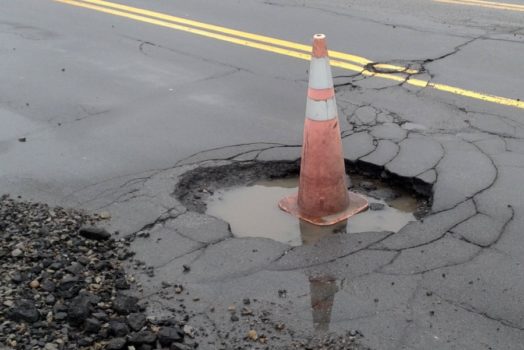
By RICK BRUNDRETT
Last week, the S.C. Department of Transportation announced it was launching a “Pothole Blitz” to repair what it contends is a growing number of potholes statewide brought on by recent heavy rains.
“It is expected that these additional efforts will take several weeks before we return to normal patching activities,” Leland Colvin, the DOT deputy secretary for engineering, said in an agency Facebook post.
In the first full year of the gas-tax-hike law, which took effect July 1, 2017, DOT claims it patched about 411,000 potholes statewide, according to its fiscal 2018 annual report. If accurate, that worked out to be an average of about 10 repaired potholes for every mile of state-maintained roads.
But The Nerve’s review of DOT’s Customer Service Center records found that the department filled far fewer potholes over the past three fiscal years through calls to the center. For its “Pothole Blitz,” the agency is encouraging the public to call the center or make online requests to report potholes.
From fiscal 2016, which started July 1, 2015, through last fiscal year, which ended June 30, the center received a total of 3,197 requests to fix potholes, with the number of annual requests dropping 47 percent over the period, according to a spreadsheet of calls obtained by The Nerve under the state Freedom of Information Act.
Just over a 1,000 requests during the period came from Richland County, where DOT is headquartered; the next-largest number (478) originated in neighboring Lexington County, records show.
DOT spent a total of $1,083,342 over the period to fix the reported problems, though the records didn’t specify the number of potholes filled. The annual amount spent dropped 63 percent by the end of last fiscal year to $229,120.
In contrast, nearly $384 million in collected revenues under the gas-tax-hike law had not been spent as of Nov. 30, and less than 12 percent of the total collections had been spent on all “external projects” identified by DOT, as The Nerve previously reported.
Lawmakers promised that the money from the gas-tax-hike law, which raised the gas tax 12 cents per gallon over six years and increased other vehicle taxes and fees, would go toward fixing the state’s crumbling roads and bridges.
The South Carolina Policy Council – the parent organization of The Nerve – has contended that the law was written in a way to allow DOT to divert revenues to the State Transportation Infrastructure Bank (STIB) to pay bond debts of the STIB.
The Nerve reported last month that under a bill by state Sen. Nikki Setzler, D-Lexington, millions would be siphoned from a main source of revenue under the gas-tax-hike law to be used for widening interstates.
The Nerve on Friday sent a list of questions to DOT about its pothole repair program in the wake of its “Pothole Blitz” announcement, including how often agency work crews regularly inspect roads, and details about repair work done outside of call center requests. No response was provided by publication of this story.
DOT has said 80 percent of the state’s approximately 42,000 miles of roads needs to be resurfaced or rebuilt, and identified 465 of 750 “structurally deficient” bridges to be replaced.
The Nerve’s review of DOT records of calls to its Customer Service Center found that from fiscal 2016 through last fiscal year, there were at least 411 reports of “large” potholes, some 70 calls involving what was described as a “sinkhole,” and 24 requests to fix “massive” or “huge” potholes.
Here’s a sampling of call notes:
- “Customer states there are about 20 massive potholes” – Greenville County.
- “Customer states the road where SCDOT previously did roadwork has numerous potholes and it’s beginning to cave in” – Lexington County.
- “This pothole was filled on 3/15, but has opened back up and is even bigger and almost a sinkhole” – Colleton County.
- “Customer states there’s a sinkhole that’s formed. She’s placed sticks in the area” – Jasper County.
- “Sink hole on the roadway at this location. Repairs were made a while back but the roadway keeps sinking” – Charleston County.
- “Length is full of potholes and sinkholes” – Aiken County.
- “Customer stated it is a huge pothole that could be a sinkhole” – Florence County
- “Customer states that a sinkhole is forming in front of her driveway. They’ve placed an orange cone so people can see where it’s forming” – Richland County.
Records show that in each of 22 largely rural counties over the three-year period, fewer than 20 requests were made to the call center. There was only one listed call in Abbeville, Bamberg, Calhoun and Edgefield counties.
Those who want to participate in the DOT’s “Pothole Blitz” can call the Customer Service Center toll free at 855-467-2368 or at 803-737-1200, or submit an online request at http://dbw.scdot.org/workrequest/.
Brundrett is the news editor of The Nerve (www.thenerve.org). Contact him at 803-254-4411 or rick@thenerve.org. Follow him on Twitter @RickBrundrett. Follow The Nerve on Facebook and Twitter @thenervesc.
Nerve stories are free to reprint and repost with permission by and credit to The Nerve.
